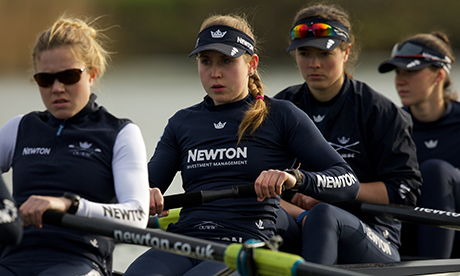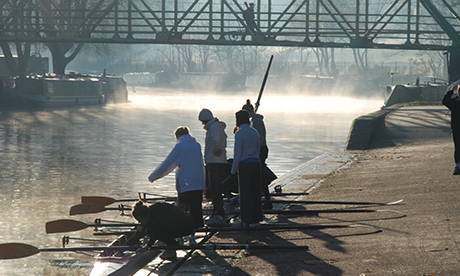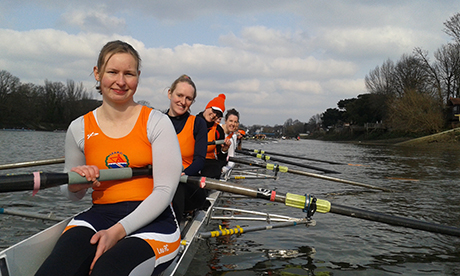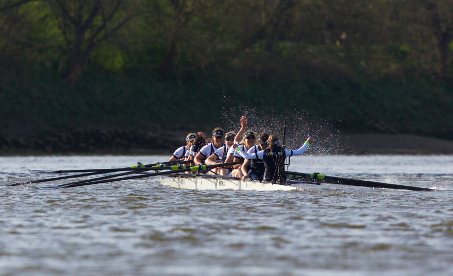Hackney club’s star rower makes waves in historic women’s Boat Race win
A rower from Hackney’s Lea Rowing Club (LRC) made history this month when she competed in the boat race between Oxford and Cambridge universities – the first ever women’s race to be given equal billing to the men’s.
The youngest member of the Oxford crew, 19-year-old Maddy Badcott appeared alongside the most decorated athlete ever to row in either the men’s or women’s race – double Olympic medallist Caryn Davies of the USA. Her team’s convincing victory of six and a half lengths was broadcast live to 9 million people across the country.
If televising the women’s race marked an overdue surge forward for the sport, Badcott’s presence in the famous dark blue kit might also represent a turning of the tide in a sport often criticised for its elitism.
Speaking to the Citizen from her student accommodation in Oxford, Badcott, who went to school in Dalston and picked up the sport at the LRC’s Learn to Row summer course, acknowledges that she does not exactly fit the stereotype.
“In the rowing world, there are a lot of jokes about being from the Lea, and it being based in Hackney,” she says. “There’s a public idea of rowing as being elitist and posh but everyone is welcome at the Lea.”
It is perhaps this open-armed approach that has earned the Spring Hill club, a centre for rowing since the 19th century, recognition as a grassroots training facility.
The LRC was recently awarded £400,000 from the National Lottery’s Sport England’s Improvement Fund and is building a new boathouse to accommodate more members.
An agreement between LRC and London Borough of Hackney will see the club increase capacity and services for local residents and schools, and offer facilities to partner sports clubs in the area.
Club Director Ian Huckvale says the new boathouse will enable the club to grow, “It will have more space for training, storage space and access for disabled people. It will also have a project for disabled rowers, one of only three London clubs to do that. We have around 400 members and hope to grow to around 600.”
Huckvale describes Badcott as an LRC “legend” and said that the women’s boat race was “huge” for the sport. “Women’s rowing is going up and up, inspired by the Olympic successes. Now people know the names of the female rowers and our club has almost an equal balance of men and women,” he says.
Journey to success
Badcott started rowing at 14 to appease her mum’s wish to “get her out of the house” during the summer holidays. Two years later her coach said it was time to stick or twist: “Come properly or stop coming altogether,” he told her.
She stuck at it, and began training up to 10 times a week, including gruelling sessions before school. Badcott would take the night bus at 5.30am from her house in De Beauvoir (“bit depressing”, she says) to do circuits in the gym or go out on the river when the sun rose.
Her teachers at school were bemused: “I had never been sporty before so they didn’t get it.”
In 2012, the year Team GB’s rowers won a record nine medals at the Olympics, Badcott won both the relay and individual races at the National Junior Rowing Championships.
She remembers blagging tickets to the Olympic rowing heats at Eton Dorney and the thrill of seeing the swarming crowds instead of “just people’s mums” on the stands.
Racing for Oxford
After a three-year battle by the Oxford and Cambridge female rowing teams for equal sponsorship and billing, the women’s race was finally moved this April from Henley to the Putney to Dortlake course, where the men’s race takes place. The pressure was on for the teams to perform.
“There was a helicopter circling, and I’ve never seen so many people on the banks. At a certain point in the race you are utterly absorbed in what you are doing and in how much it hurts so you tune out, but when you cross the finish line it is like: ‘Oh my god’. It was incredible,” says Badcott.
And what did the landmark race mean for women’s sport? “Women who have been involved with the women’s squad have had to put up with inequality for years and years. Us in the boats were a small part of the battle.
“I think around 9 million people watched the women’s race on TV which is fantastic, especially for everyone who says that women’s sport is boring and no one wants to watch it.
“Hopefully it will make people shut up about women’s sport not deserving the coverage, and not deserving the funding.”
Lea Rowing Club runs Learn2row courses for beginners who want to give rowing a try, with courses tailored for adults, juniors and schools. If you are interested in signing up send an email to secretary@learc.org.uk for more details.




